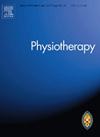Exploring physiotherapist experiences and beliefs about psychologically informed practice to inform development of a training programme
IF 3
3区 医学
Q1 REHABILITATION
引用次数: 0
Abstract
Aim
To explore physiotherapists' experiences, beliefs, and opinions about psychologically informed practice (PIP) in order to design a training programme for non-psychologist clinicians to enhance their PIP skills.
Design
This study adopted an interpretive description qualitative methodology using focus groups and consistent with the aim of generating knowledge relevant to applied health and to inform the design of a training programme.
Participants
Phase one included musculoskeletal physiotherapists (n=18) who were purposively sampled to take part in two focus groups. A third focus group consisted of pain specialist physiotherapists (n=6) recruited from a specialist network in the UK called the Physiotherapy Pain Association (PPA) to explore further topics identified in phase one and to inform training development.
Data analysis and synthesis
Qualitative content analysis was used as a framework for data analysis and consisted of subjective interpretation of textual data through a systematic classification process of coding and identifying themes or patterns.
Results
Three interconnected themes that provide insights into the perceptions and experiences of physiotherapists concerning PIP were constructed: 1) Professional Roles and External Influences on PIP, 2) Interpersonal Aspects of PIP, and 3) Support Needs to Enhance PIP Application.
Conclusion
The findings provide an understanding of the multifaceted nature of PIP and its impact within healthcare settings. They will inform development of training to address gaps and provide practical strategies for enhancing PIP for non-psychologists.
Contribution of the paper
- •Our findings concur with existing literature regarding application of psychologically informed practice; that physiotherapists recognise that there are challenges in applying knowledge and skills relating to psychologically informed practice.
- •With increasing complexity and numbers of people living with multiple long-term conditions it is important for physiotherapists to increase their confidence in order to ensure they are considering the psycho-social aspects of care for this population.
- •A desire for training in psychologically informed practice was expressed and in addition supervision and mentorship was recognised as essential in supporting clinicians to embed skills and increase confidence.
探索物理治疗师的经验和关于心理知情实践的信念,为培训计划的发展提供信息
目的探讨物理治疗师对心理知情实践(psychological informed practice, PIP)的经验、信念和看法,以便为非心理学家临床医生设计一个培训计划,以提高他们的PIP技能。设计本研究采用了解释性描述定性方法,采用焦点小组,符合产生与应用保健有关的知识并为培训方案的设计提供信息的目标。参与者第一阶段包括肌肉骨骼物理治疗师(n=18),他们被有意抽样分为两个焦点小组。第三个焦点小组由疼痛专家物理治疗师(n=6)组成,他们是从英国一个名为物理治疗疼痛协会(PPA)的专家网络中招募的,以探讨在第一阶段确定的进一步主题,并为培训发展提供信息。数据分析和综合定性内容分析被用作数据分析的框架,包括通过编码和识别主题或模式的系统分类过程对文本数据的主观解释。结果构建了三个相互关联的主题,提供了对物理治疗师关于PIP的看法和经验的见解:1)专业角色和对PIP的外部影响,2)PIP的人际关系方面,以及3)支持需求以加强PIP应用。结论研究结果提供了PIP的多面性及其在医疗保健环境中的影响的理解。它们将为解决差距的培训发展提供信息,并为加强非心理学家的PIP提供切实可行的战略。•我们的发现与关于心理知情实践应用的现有文献一致;物理治疗师认识到,在应用与心理知情实践有关的知识和技能方面存在挑战。•随着复杂性的增加和患有多种长期疾病的人数的增加,对于物理治疗师来说,增加他们的信心是很重要的,以确保他们考虑到照顾这些人群的心理-社会方面。•表达了对心理知情实践培训的愿望,此外,监督和指导被认为是支持临床医生嵌入技能和增强信心的必要条件。
本文章由计算机程序翻译,如有差异,请以英文原文为准。
求助全文
约1分钟内获得全文
求助全文
来源期刊

Physiotherapy
医学-康复医学
CiteScore
6.40
自引率
3.00%
发文量
377
审稿时长
82 days
期刊介绍:
Physiotherapy aims to publish original research and facilitate continuing professional development for physiotherapists and other health professions worldwide. Dedicated to the advancement of physiotherapy through publication of research and scholarly work concerned with, but not limited to, its scientific basis and clinical application, education of practitioners, management of services and policy.
We are pleased to receive articles reporting original scientific research, systematic reviews or meta-analyses, theoretical or debate articles, brief reports and technical reports. All papers should demonstrate methodological rigour.
 求助内容:
求助内容: 应助结果提醒方式:
应助结果提醒方式:


